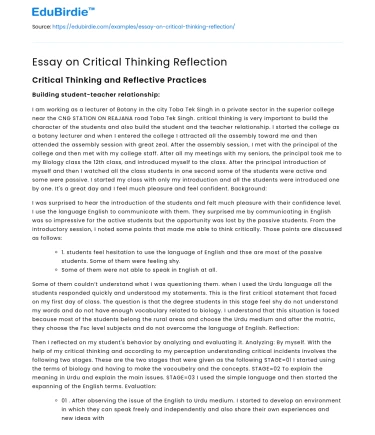Introduction
Critical thinking is a foundational element in the realm of intellectual discourse and decision-making. It involves the objective analysis and evaluation of an issue in order to form a judgment. As noted by Ennis (2011), critical thinking encompasses both cognitive skills and affective dispositions. The ability to think critically is not only pivotal in academic settings but also in everyday life, where decisions must be made based on sound reasoning and evidence. This essay will delve into the intricacies of critical thinking, examine the varied perspectives on its application, and reflect on its significance in both personal and professional contexts. By exploring specific cases and counterarguments, this discussion aims to underscore the importance of fostering critical thinking skills to navigate the complexities of the modern world.
Understanding Critical Thinking
To comprehend the multifaceted nature of critical thinking, it is essential to explore its definitions and components. As Paul and Elder (2006) articulate, critical thinking is the disciplined art of ensuring that one uses the best thinking one is capable of in any set of circumstances. This involves several core skills, including analysis, evaluation, inference, and explanation. For instance, in a scientific setting, critical thinking enables researchers to evaluate hypotheses, scrutinize methodologies, and interpret results with precision and clarity. Such skills are not innate; they require cultivation through education and practice.
Save your time!
We can take care of your essay
- Proper editing and formatting
- Free revision, title page, and bibliography
- Flexible prices and money-back guarantee
Consider the real-life case of the Challenger space shuttle disaster, which highlights the dire consequences of inadequate critical thinking. Engineers at NASA had sufficient data suggesting a potential malfunction of the O-rings at low temperatures, yet the decision-makers ignored these warnings due to organizational pressure and confirmation bias (Vaughan, 1996). This tragic event underscores the necessity for critical thinking in decision-making processes, particularly in high-stakes environments. By critically evaluating evidence and questioning assumptions, individuals can avoid cognitive pitfalls and make more informed decisions.
Transitioning from theoretical underpinnings to practical applications, it is imperative to recognize that critical thinking is not merely an academic exercise; it is a vital skill in navigating everyday challenges. As educational psychologist Diane Halpern (1998) suggests, teaching critical thinking should be an integral part of education systems to prepare students for the complexities of real-world problems. By fostering an environment that encourages questioning and open-mindedness, educational institutions can equip learners with the tools necessary to thrive in a rapidly changing world.
Challenges and Counterarguments
Despite the clear benefits of critical thinking, some argue that it may not always lead to optimal outcomes. One such counterargument is that excessive skepticism can lead to decision paralysis, where individuals become so bogged down by analysis that they are unable to take decisive action. This phenomenon, often referred to as "analysis paralysis," suggests that there is a delicate balance between critical reflection and decisive action. For example, in business contexts, leaders may face the challenge of making timely decisions with incomplete information, where overthinking could hinder progress (Kahneman, 2011).
Furthermore, critics of critical thinking education claim that it may lead to relativism or the idea that all viewpoints are equally valid, which can undermine the pursuit of objective truth. However, defenders of critical thinking assert that it is about reasoned judgment rather than skepticism for its own sake. By teaching individuals to evaluate arguments based on evidence and logic, critical thinking strengthens, rather than weakens, the pursuit of truth.
Transitioning from criticism to the enhancement of critical thinking, it is crucial to address how these challenges can be mitigated. One approach is to emphasize the development of metacognitive skills, allowing individuals to be aware of their own thought processes and biases. As Perkins (1992) suggests, metacognition fosters self-regulation and helps individuals strike a balance between critical analysis and practical decision-making. By incorporating metacognitive strategies into critical thinking education, individuals can become more adept at navigating complex situations without succumbing to the pitfalls of over-analysis or relativism.
The Significance of Critical Thinking
The significance of critical thinking extends beyond academic and professional domains into the realm of personal growth and societal development. In an era characterized by information overload and rapid technological advancements, the ability to think critically is more crucial than ever. It enables individuals to discern credible information from misinformation, fostering a more informed and engaged citizenry.
Moreover, critical thinking promotes empathy and understanding by encouraging individuals to consider diverse perspectives and challenge their own biases. This capacity for empathy is essential in addressing complex social issues such as inequality, climate change, and global conflicts. By engaging in thoughtful reflection and dialogue, individuals can contribute to more equitable and sustainable solutions.
Concluding this reflection on critical thinking, it is evident that the cultivation of this skill is indispensable in navigating the intricacies of modern life. As the philosopher John Dewey (1933) aptly stated, "A problem well put is half solved." Developing critical thinking skills empowers individuals to articulate problems clearly and approach them with a mindset geared toward resolution. In fostering a culture of critical inquiry, we pave the way for innovation, progress, and a more thoughtful society.
Conclusion
In summation, critical thinking is a vital competency that transcends disciplinary boundaries and enriches both personal and societal spheres. Through the examination of its definitions, applications, and challenges, this essay underscores the significance of nurturing critical thinking skills in an ever-evolving world. While counterarguments raise valid concerns about potential drawbacks, the benefits of critical thinking in facilitating informed decision-making and fostering empathy are undeniable.
By integrating critical thinking education into curricula and encouraging its application in daily life, we can prepare individuals to confront the uncertainties of the future with confidence and clarity. Ultimately, the ability to think critically is not just an academic exercise but a fundamental component of human flourishing, enabling individuals to navigate the complexities of the world with insight and integrity.






 Stuck on your essay?
Stuck on your essay?

